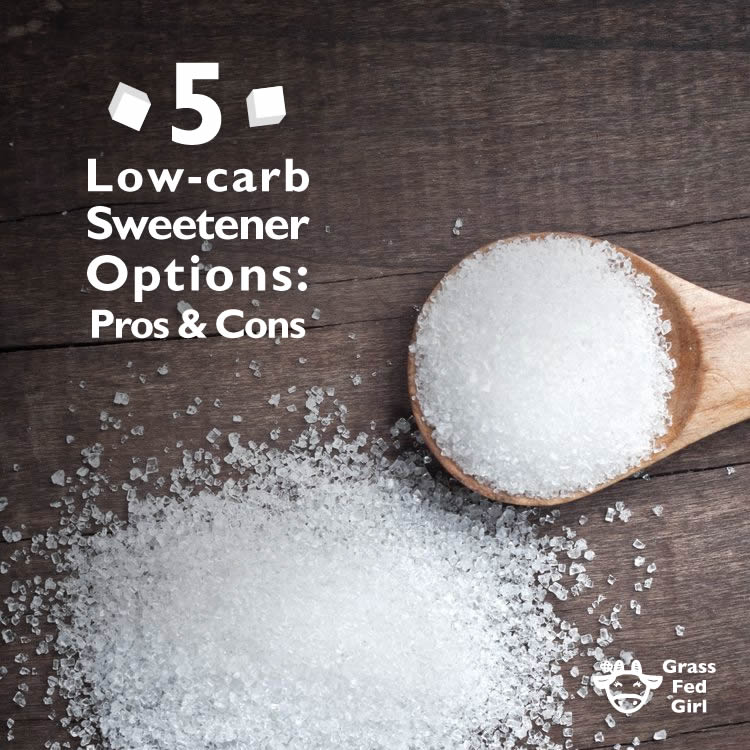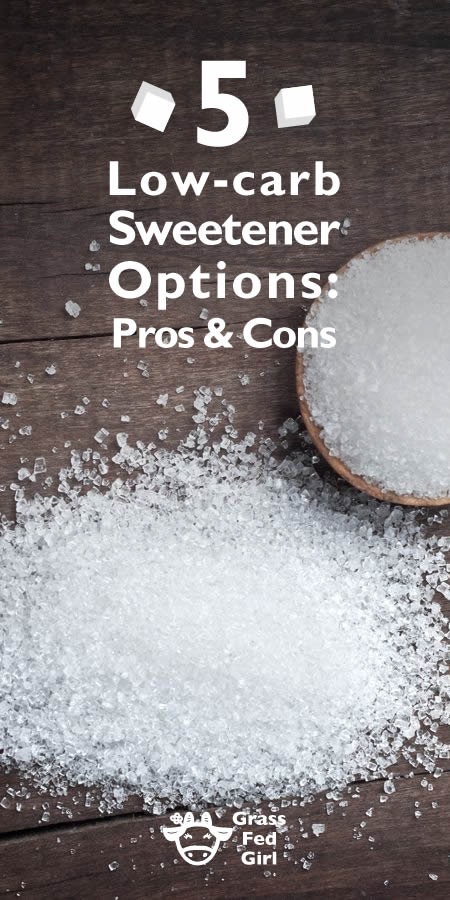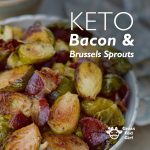
5 Alternatives to Artificial Sweeteners with Pros and Cons:
A study published in the Public Library of Science found that sugar is more addictive than cocaine. This is why the average American consumes 19 teaspoons of the sweet stuff every day!
Unfortunately, refined sugar has many negative health effects, including tooth decay, obesity, heart disease, and insulin resistance. This painful truth is the reason why individuals who want to maintain a healthy lifestyle is on the hunt for sugar substitutes that won’t compromise their well-being.
A big issue on low carb that can slow down results and have a big impact on long-term health is using artificial sweeteners such as aspartame and sucralose. Those dangers are well documented and you can read more about why they should be avoided here and here. This post looks at the most natural options that have become popular over the last 10-20 years that can be a healthier addition to a low carb or keto diet.
- Swerve
The makers of Swerve tout it as an all-natural sweetener that tastes great with only minor side effects.
Pros:
Erythritol, along with other sugar alcohols, have little or no impact on insulin as well as on blood sugar levels.
It contains fewer calories than table sugar and every teaspoon has only 5 grams of carbohydrates.
Moreover, erythritol is linked with a lower risk of tooth decay and gum disease.
Cons:
Although all the ingredients used in Swerve are considered to be GRAS (Generally Recognized as Safe) according to the U.S. FDA, large quantities of erythritol can cause bloating, gas, and diarrhea in sensitive individuals.
Some reports have also indicated mild allergic reactions to erythritol, which include itching and hives.
You can order Swerve here.
- Monk Fruit
Monk fruit sweeteners are made from the fruit extract, which is 150 to 200 times sweeter than sugar.
Pros:
Monk fruit extract is as sweet as stevia but without the bitter aftertaste associated with most stevia products.
It does not affect blood sugar levels.
Monk fruit has no calories, carbohydrates, sodium, and fat, which makes it a great sugar substitute for people who are trying to lose weight.
Cons:
Some monk fruit products contain dextrose, maltodextrin, and other inessential additives. Depending on the processing used on the ingredients, you might be getting a product that is less natural and with a compromised nutritional profile.
Monk fruit’s fruity taste puts some people off while some reported an unpleasant aftertaste.
You can get Monk Fruit here.
- Stevia
Stevia is an herb (my personal favorite) whose leaves contain steviol glycosides, which are compounds that are 200-300 times sweeter than sugar.
Pros:
Stevia is 200-300 times sweeter than sugar so you don’t need as much in your tea or other drinks.
It is available in many forms including liquid, powder, and granules.
Natural stevia sweeteners were found to have no effect on insulin or blood sugar levels. Studies have even shown that stevia extract has a positive effect on controlling blood sugar.
Stevia is a good option for people who are trying to lose weight because it contains no calories.
Cons:
Most stevia products are highly refined to remove the bitter aftertaste. As a result, the product you could be getting is no longer completely natural.
Powdered stevia products may have added dextrose, maltodextrin, sugar, and other artificial sweeteners, which could affect blood sugar. These products may also contain hidden carbs, which is not ideal for people who want to achieve a ketogenic state.
Stevia may cause nausea, bloating, and gas as well as allergic reactions.
You can get liquid stevia here and powdered stevia here.
- Xylitol
Naturally occurring in the fibers of certain fruits and vegetables, xylitol is a sugar alcohol that tastes just like sugar.
Pros:
Although xylitol tastes like sugar, it contains 34% fewer calories and it does not spike blood sugar levels as much as table sugar does.
Xylitol can improve dental health as it does not cause tooth decay since it cannot be metabolized by plaque-causing bacteria.
Cons:
One of the biggest drawbacks of this sugar substitute is that most xylitol is manufactured from GMO corn. It is best to get the kind that is sourced from birch trees to avoid genetic engineering.
Consumption of more than 2 ½ to 5 tablespoons (30-60 grams) of xylitol can cause gastric distress, such as bloating or diarrhea. Be extra cautious if you are prone to digestive problems.
If you’re trying to lose weight or wanting to reduce your caloric intake, xylitol may not be your best choice because it is not a low-calorie sugar substitute. What’s more, it causes a minor sugar rush so it won’t be helpful if you’re trying to kick a sugar habit.
Xylitol is toxic to dogs so make sure you store it properly.
You can order non-gmo xylitol here.
- Yacon Syrup
Extracted from a sweet potato-like tuberous roots grown in South America, yacon syrup is a sugar substitute that has a slight caramel taste.
Pros:
Yacon syrup is low in calories and high in naturally occurring sugars, such as insulin and fructooligosaccharides (FOS). FOS, which has fiber-like qualities help lower cholesterol and balance blood sugar levels. It also aids digestion by promoting the development of good gut bacteria.
Yacon syrup is high in antioxidants as well as potassium.
It can help control appetite, which makes it an ideal sugar substitute for people who want to lose weight.
Cons:
One tablespoon should be your total yacon syrup intake per day as large doses can cause bloating, flatulence, nausea, and diarrhea.
Because of the high fiber content of yacon syrup, excessive consumption can lead to digestive discomfort. It is best to avoid yacon syrup if you are prone to intestinal problems.
Yacon syrup is not ideal for baking as FOS breaks down at temperatures of 120 C / 248 F and higher.
You can get yacon syrup here.
The abundance of artificial sweetener alternatives on the market means more and more people are becoming aware of the dangers of sugar. Many people know that excess sugar is detrimental but switching to a natural alternative can have pro’s and con’s too. It’s best to do your own research and test on yourself to figure out which natural sweetener option is best for your body.
Which alternative artificial sweeteners do you like best? Leave a comment and let me know! Thanks for reading.
Get it here:





You know that the right solution to the sugar issue is to only eat natural sugars. Fruit and the like, unprocessed. Heck, you can even eat a stick of sugar cane if you want. Just don’t down the refined stuff.
My practices are all natural and that is why I raise and eat grass fed beef with no hormones, pesticides or herbicides. The closer we get to nature, the better our bodies will feel. Same goes for sugar.
You did a nice analysis of the options for low carb, it is too bad they are all refined solutions.
Dave
Forest Cattle Company LLC
I’m using Stevia more and more now. When I initially tried it several years ago I would get a horrible migraine *every* time I used it. It was awful, so I stopped. I’ve recently started trying again and stepping up slowly seems to be keeping the migraines away.
Stevia is my choice.
I feel for me, Stevia is my safest sugar substitute and won’t affect my blood sugars.
Im learning so much reading your posts. IT has explained alot of my family’s health problems. THank you